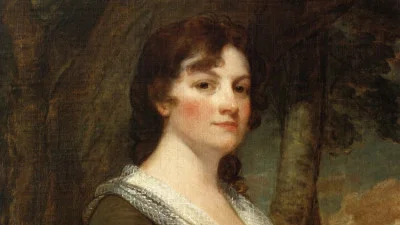Since the 18th century, women have played an important role at Mount Vernon.
Martha Washington helped manage and run the estate. The work of enslaved women was critical to the success of the plantation. In the 19th century a group of women, the Mount Vernon Ladies’ Association, saved the estate from ruin. The organization still owns and operates the Washingtons’ home today.

Martha Washington
Martha Washington was the first first lady of the United States and spent about half of the Revolutionary War at the front with General Washington. She helped manage and run her husbands' estates and raised her children, grandchildren, nieces, and nephews.
Learn more
Enslaved Labor
George and Martha Washington's lives depended on the labor of Mount Vernon's enslaved community. They relied on many women trained in specific jobs including cooks, housemaids, textile workers, and dairy maids. The plantation would not have functioned without the agricultural workers, the majority of whom were women.
Learn more
Mount Vernon Ladies' Association
The Mount Vernon Ladies' Association was the first national historic preservation organization and is the oldest women's patriotic society in the United States. Its pioneering efforts in the field of preservation set an important precedent and have served as a model for many.
Learn more
Doll
Doll worked as an enslaved cook. She was the matriarch of one of the largest extended families within Mount Vernon’s enslaved community.
Learn moreMary Ball Washington
Despite her many mythologies, George Washington's mother was a strong, complex, and anxious woman. She was a fervent reader of devotional books, frugal to a fault, and on occasion, so cash poor as to be unable to feed herself and her dependents.
Priscilla and Penny
Priscilla and her daughter Penny lived and worked at Dogue Run Farm.

Ann Pamela Cunningham
The founder of the Mount Vernon Ladies Association, Ann Pamela Cunningham created the organization responsible for saving and restoring George Washington's home.

Family Life
At Mount Vernon, many enslaved families were separated across farms due to work assignments. Often a mother and her children lived on one farm, while her husband lived miles away on another farm.

Elizabeth Parke Custis
Elizabeth was the eldest of Martha Washington's four surviving grandchildren. As an adult, she and her husband Thomas Law took an active role entertaining many dignitaries and prominent members of the political class. Following an extended business trip to England, however, the couple separated during the summer of 1804. Family members believed that the couple's thorny personalities were equally at fault.
MVLA and Women's Suffrage
As a non-partisan organization, the Mount Vernon Ladies’ Association never took an official stance on women’s suffrage. Outside their roles in the MVLA, some Vice Regents expressed strong opinions.
Caroline Branham
Character Interpreter Brenda Parker remembers the life of Caroline Branham: mother of eight, wife of Peter Hardiman, and enslaved housemaid at Mount Vernon.
Kate
In the 1790s, Kate wanted to serve as a midwife for the enslaved community. Her bold request hints at the social dynamics governing relationships both within the enslaved population and between master and slave.

Regents
The chair of the Mount Vernon Ladies' Association is called the Regent. Their inspiring stories truly impacted the ongoing preservation of George Washington's home.

Elizabeth Willing Powel
Considered one of the premiere social figures of Colonial and Early Republic Philadelphia, Elizabeth Willing Powel played a vital role in American history as a close friend and confidant to both George and Martha Washington.

Nelly Custis's New Harpsichord
Martha Washington's granddaughter, Nelly Custis, was a talented musician. Her harpsichord was recently painstakingly recreated.

Ona Judge
Ona Judge Staines served as personal servant to Martha Washington until she escaped from the President's Mansion in Philadelphia and relocated to Portsmouth, New Hampshire in 1796.

Women of Washington's Life Quiz
There were a number of women who played pivotal roles in George Washington’s life. Do you know who they were?
Kitty
Kitty worked as an enslaved milkmaid and spinner at Mansion House Farm.














